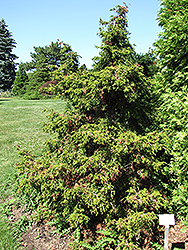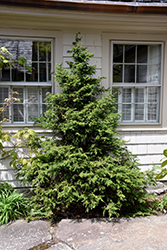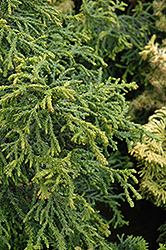Plant Library
Torulosa Dwarf Hinoki Falsecypress*
Chamaecyparis obtusa 'Torulosa'
* This is a "special order" plant - contact store for details
Height: 7 feet
Spread: 6 feet
Sunlight:
![]()
![]()
Hardiness Zone: 5a
Description:
A compact, broadly pyramidal version of the species, with twisted, threadlike foliage; attractive foliage emerges light green turning to a deeper green; an interesting, beautiful landscape accent
Ornamental Features
Torulosa Dwarf Hinoki Falsecypress is a dwarf conifer which is primarily valued in the landscape or garden for its distinctively pyramidal habit of growth. It has attractive green evergreen foliage which emerges light green in spring. The twisted scale-like sprays of foliage are highly ornamental and remain green throughout the winter.
Landscape Attributes
Torulosa Dwarf Hinoki Falsecypress is a dense multi-stemmed evergreen shrub with a distinctive and refined pyramidal form. It lends an extremely fine and delicate texture to the landscape composition which can make it a great accent feature on this basis alone.
This is a relatively low maintenance shrub. When pruning is necessary, it is recommended to only trim back the new growth of the current season, other than to remove any dieback. It has no significant negative characteristics.
Torulosa Dwarf Hinoki Falsecypress is recommended for the following landscape applications;
- Accent
- Vertical Accent
- Rock/Alpine Gardens
- General Garden Use
- Container Planting
Planting & Growing
Torulosa Dwarf Hinoki Falsecypress will grow to be about 7 feet tall at maturity, with a spread of 6 feet. It tends to fill out right to the ground and therefore doesn't necessarily require facer plants in front, and is suitable for planting under power lines. It grows at a slow rate, and under ideal conditions can be expected to live for 40 years or more.
This shrub does best in full sun to partial shade. It prefers to grow in average to moist conditions, and shouldn't be allowed to dry out. This plant does not require much in the way of fertilizing once established. It is not particular as to soil type or pH. It is highly tolerant of urban pollution and will even thrive in inner city environments, and will benefit from being planted in a relatively sheltered location. Consider applying a thick mulch around the root zone in winter to protect it in exposed locations or colder microclimates. This is a selected variety of a species not originally from North America.
Torulosa Dwarf Hinoki Falsecypress makes a fine choice for the outdoor landscape, but it is also well-suited for use in outdoor pots and containers. With its upright habit of growth, it is best suited for use as a 'thriller' in the 'spiller-thriller-filler' container combination; plant it near the center of the pot, surrounded by smaller plants and those that spill over the edges. It is even sizeable enough that it can be grown alone in a suitable container. Note that when grown in a container, it may not perform exactly as indicated on the tag - this is to be expected. Also note that when growing plants in outdoor containers and baskets, they may require more frequent waterings than they would in the yard or garden.
* This is a "special order" plant - contact store for details




